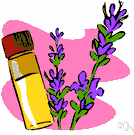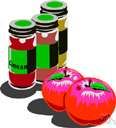spice
(redirected from spicing)Also found in: Thesaurus, Medical, Idioms, Encyclopedia.
spice
(spīs)n.
1.
a. Any of various pungent, aromatic plant substances, such as cinnamon or nutmeg, used to flavor foods or beverages.
b. These substances considered as a group.
2. Something that adds zest or interest: The controversy added spice to the political campaign.
3. A pungent aroma.
tr.v. spiced, spic·ing, spic·es
1. To season with spices.
2. To add zest or interest to: uses witty rhymes to spice up the song.
[Middle English, from Old French espice, from Late Latin speciēs, wares, spices, from Latin, kind; see species.]
American Heritage® Dictionary of the English Language, Fifth Edition. Copyright © 2016 by Houghton Mifflin Harcourt Publishing Company. Published by Houghton Mifflin Harcourt Publishing Company. All rights reserved.
spice
(spaɪs)n
1. (Cookery)
a. any of a variety of aromatic vegetable substances, such as ginger, cinnamon, nutmeg, used as flavourings
b. these substances collectively
2. something that represents or introduces zest, charm, or gusto
3. rare a small amount
4. (Cookery) dialect Yorkshire confectionery
vb (tr)
5. (Cookery) to prepare or flavour (food) with spices
6. to introduce charm or zest into
[C13: from Old French espice, from Late Latin speciēs (pl) spices, from Latin speciēs (sing) kind; also associated with Late Latin spīcea (unattested) fragrant herb, from Latin spīceus having spikes of foliage; see spica]
ˈspicer n
Collins English Dictionary – Complete and Unabridged, 12th Edition 2014 © HarperCollins Publishers 1991, 1994, 1998, 2000, 2003, 2006, 2007, 2009, 2011, 2014
spice
(spaɪs)n., v. spiced, spic•ing. n.
1. a pungent or aromatic vegetable substance, as pepper or cinnamon, used to season food.
2. such substances collectively.
3. a spicy or aromatic odor or fragrance.
4. something that gives zest or piquancy: The anecdotes added spice to the speech.
5. Archaic. a small quantity; trace.
v.t. 6. to season with spice.
7. to give zest, piquancy, or interest to.
[1175–1225; (n.) Middle English, aph. form of Old French espice < Latin speciēs appearance, sort, kind (see species), in Late Latin (pl.): wares, spices, drugs]
Random House Kernerman Webster's College Dictionary, © 2010 K Dictionaries Ltd. Copyright 2005, 1997, 1991 by Random House, Inc. All rights reserved.
See also related terms for seasoning.
Farlex Trivia Dictionary. © 2012 Farlex, Inc. All rights reserved.
spice
Past participle: spiced
Gerund: spicing
| Imperative |
|---|
| spice |
| spice |
Collins English Verb Tables © HarperCollins Publishers 2011
ThesaurusAntonymsRelated WordsSynonymsLegend:
Switch to new thesaurus
| Noun | 1. |  spice - aromatic substances of vegetable origin used as a preservative spice - aromatic substances of vegetable origin used as a preservativepreservative - a chemical compound that is added to protect against decay or decomposition stacte - (Old Testament) one of several sweet-smelling spices used in incense |
| 2. | spice - any of a variety of pungent aromatic vegetable substances used for flavoring food flavorer, flavoring, flavourer, flavouring, seasoning, seasoner - something added to food primarily for the savor it imparts five spice powder - Chinese seasoning made by grinding star anise and fennel and pepper and cloves and cinnamon allspice - ground dried berrylike fruit of a West Indian allspice tree; suggesting combined flavors of cinnamon and nutmeg and cloves cinnamon - spice from the dried aromatic bark of the Ceylon cinnamon tree; used as rolled strips or ground clove - spice from dried unopened flower bud of the clove tree; used whole or ground fennel - fennel seeds are ground and used as a spice or as an ingredient of a spice mixture powdered ginger, ginger - dried ground gingerroot mace - spice made from the dried fleshy covering of the nutmeg seed nutmeg - hard aromatic seed of the nutmeg tree used as spice when grated or ground star aniseed, Chinese anise, star anise - anise-scented star-shaped fruit or seed used in Asian cooking and medicine | |
| 3. | spice - the property of being seasoned with spice and so highly flavored taste property - a property appreciated via the sense of taste raciness, pungency, sharpness, bite - a strong odor or taste property; "the pungency of mustard"; "the sulfurous bite of garlic"; "the sharpness of strange spices"; "the raciness of the wine" pepperiness, hotness - a hot spiciness | |
| Verb | 1. | spice - make more interesting or flavorful; "Spice up the evening by inviting a belly dancer" alter, change, modify - cause to change; make different; cause a transformation; "The advent of the automobile may have altered the growth pattern of the city"; "The discussion has changed my thinking about the issue" salt - add zest or liveliness to; "She salts her lectures with jokes" |
| 2. |  spice - add herbs or spices to spice - add herbs or spices to cookery, cooking, preparation - the act of preparing something (as food) by the application of heat; "cooking can be a great art"; "people are needed who have experience in cookery"; "he left the preparation of meals to his wife" ginger - add ginger to in order to add flavor; "ginger the soup" pepper - add pepper to; "pepper the soup" |
Based on WordNet 3.0, Farlex clipart collection. © 2003-2012 Princeton University, Farlex Inc.
spice
noun
spice something up make more interesting, enliven, liven up, animate, perk up, pep up, invigorate, vitalize, vivify, make more exciting Her publishers wants her to spice the stories up with sex. see herbs, spices and seasonings
Collins Thesaurus of the English Language – Complete and Unabridged 2nd Edition. 2002 © HarperCollins Publishers 1995, 2002
spice
nounThe American Heritage® Roget's Thesaurus. Copyright © 2013, 2014 by Houghton Mifflin Harcourt Publishing Company. Published by Houghton Mifflin Harcourt Publishing Company. All rights reserved.
Translations
kořeníokořenitoživení
krydderikrydre
maustemaustaa
začin
fűszer
bumbu
kryddkryddaupplífgun, krydd
香辛料スパイス
향신료
paskaninti prieskoniaissu prieskoniais
dzīvīgumsgaršvielapielikt garšvielaspikantums
začimbazačiniti
krydda
เครื่องเทศ
gia vị
spice
[spaɪs]A. N
B. VT
1. (Culin) → condimentar, sazonar
C. CPD spice rack N → especiero m
spice up VT + ADV
1. (= season) → condimentar, dar más sabor a
use it to spice up rice dishes and stews → úselo para condimentar or dar mas sabor a los platos de arroz y estofados
use it to spice up rice dishes and stews → úselo para condimentar or dar mas sabor a los platos de arroz y estofados
Collins Spanish Dictionary - Complete and Unabridged 8th Edition 2005 © William Collins Sons & Co. Ltd. 1971, 1988 © HarperCollins Publishers 1992, 1993, 1996, 1997, 2000, 2003, 2005
Collins English/French Electronic Resource. © HarperCollins Publishers 2005
spice
n
→ Gewürz nt; spice rack → Gewürzbord or -regal nt; spice trade → Gewürzhandel m; mixed spice → Gewürzmischung f
vt (lit, fig) → würzen
Collins German Dictionary – Complete and Unabridged 7th Edition 2005. © William Collins Sons & Co. Ltd. 1980 © HarperCollins Publishers 1991, 1997, 1999, 2004, 2005, 2007
spice
[spaɪs]1. n (Culin) → droga, spezia (fig) → sapore m
mixed spice(s) → spezie miste
variety is the spice of life → la varietà dà sapore alla vita
mixed spice(s) → spezie miste
variety is the spice of life → la varietà dà sapore alla vita
2. vt (Culin) → condire (con spezie), aromatizzare
a highly spiced account → un racconto molto gustoso
a highly spiced account → un racconto molto gustoso
Collins Italian Dictionary 1st Edition © HarperCollins Publishers 1995
spice
(spais) noun1. a usually strong-smelling, sharp-tasting vegetable substance used to flavour food (eg pepper or nutmeg). We added cinnamon and other spices.
2. anything that adds liveliness or interest. Her arrival added spice to the party.
verb to flavour with spice. The curry had been heavily spiced.
spiced adjective containing spice(s). The dish was heavily spiced.
ˈspicy adjective tasting or smelling of spices. a spicy cake; He complained that the sausages were too spicy for him.
ˈspiciness nounKernerman English Multilingual Dictionary © 2006-2013 K Dictionaries Ltd.
spice
→ تَابِل koření krydderi Gewürz μπαχαρικό especia mauste épice začin spezia 香辛料 향신료 specerij krydder przyprawa especiaria специя krydda เครื่องเทศ baharat gia vị 香料Multilingual Translator © HarperCollins Publishers 2009
spice
n. especia, condimento.
English-Spanish Medical Dictionary © Farlex 2012
spice
n especia, condimentoEnglish-Spanish/Spanish-English Medical Dictionary Copyright © 2006 by The McGraw-Hill Companies, Inc. All rights reserved.